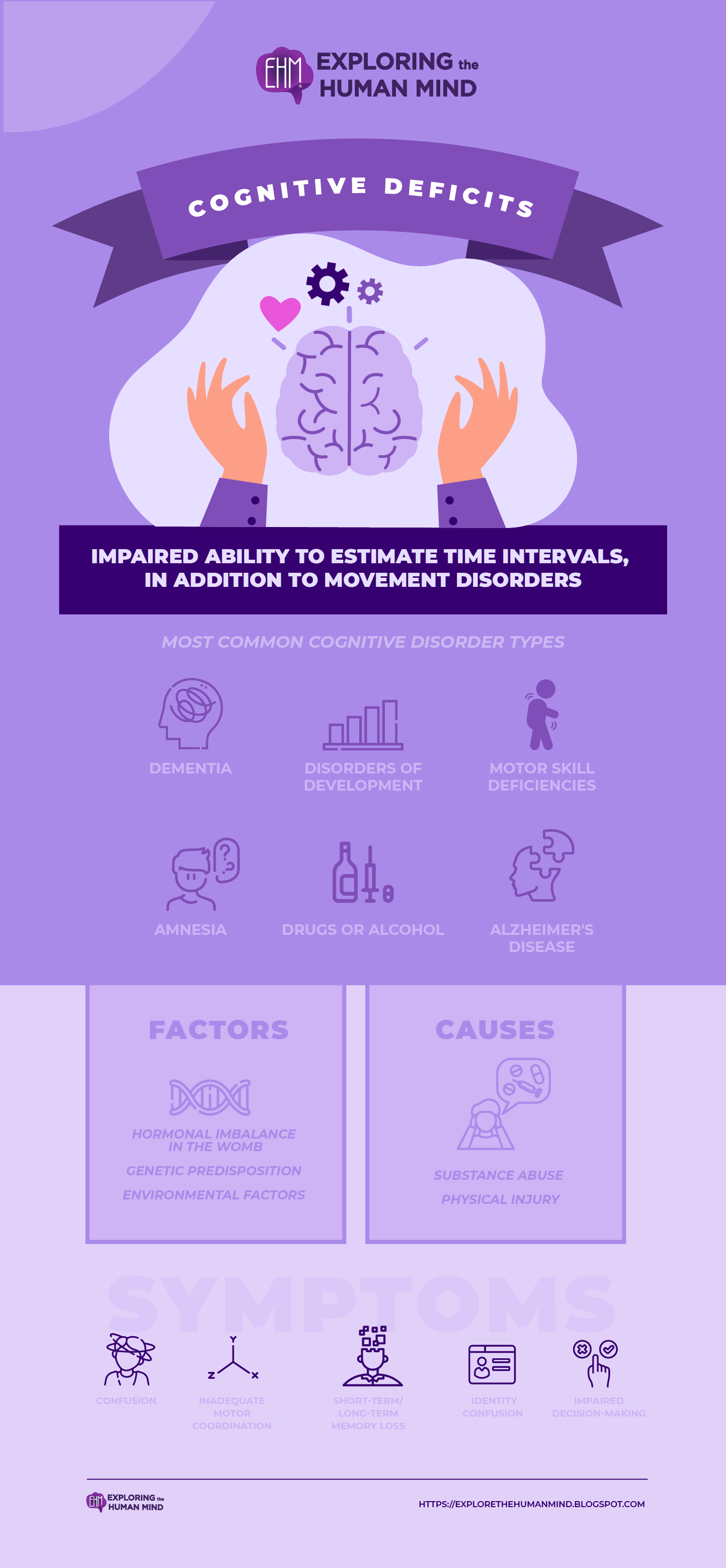Cognitive Deficits
The disease can cause any cognitive disorder. The treatment for each cognitive disorder is determined by the specific diagnosis, but the treatments are never curative. Treatments are instead intended to alleviate patients' symptoms. Current research is aimed at better understanding the underlying causes of cognitive disorders and developing better treatments for them.
Types
In the fifth edition of the Diagnostic and Statistical Manual of Mental Disorders (DSM-V), cognitive disorders are classified as neurocognitive disorders. Cognitive disorders are defined as any disorder that significantly impairs an individual's cognitive function to the point where normal functioning in society is impossible in the absence of treatment. Among the most common cognitive disorders are:
- Dementia
- Disorders of development
- Motor skill deficiencies
- Amnesia
- Cognitive impairment caused by drugs or alcohol
- One of the most common cognitive disorders, Alzheimer's disease, affects approximately 5.1 million Americans
Factors
Cognitive disorders, like most mental disorders, are caused by a variety of factors. Some are caused by hormonal imbalances in the womb, others by genetic predisposition, and still others by environmental factors. A lack of proper nutrients and interaction during vulnerable stages of cognitive development, particularly during infancy, are common environmental causes of cognitive disorders.
Causes
Substance abuse and physical injury are two other common causes of cognitive disorder. When an area of the brain that controls cognitive function is damaged, whether through excessive drug or alcohol use or physical trauma, neurophysiological changes can occur, resulting in cognitive dysfunction.
Symptoms
Cognitive disorder symptoms vary depending on the disorder, but some common signs and symptoms are shared by most disorders. The following are some of the most common symptoms of cognitive disorder:
- confusion
- inadequate motor coordination
- short-term or long-term memory loss
- confusion about one's identity
- impaired decision-making
Some cognitive disorders progress in stages, with symptoms getting worse as the disease does. For instance, the patient with Alzheimer's disease first displays very subtle forgetfulness. Patients may forget names they are familiar with or struggle to recall recent activities. Early-onset Alzheimer's disease frequently begins with symptoms that are difficult to distinguish from ordinary memory problems. But as the illness advances, the affected person's memory gradually deteriorates over time. They may occasionally experience moments of clarity, but this is not the norm.
Depression and Cognitive Problems
There is a strong correlation between cognitive disorders and depression, and many depression-related illnesses are accompanied by mild cognitive dysfunction. If a person experiences memory loss and believes they have lost something they will never be able to get back, this can naturally result in depression. Doctors may recommend an antidepressant or other lifestyle changes to treat depression if there is a link between it and cognitive issues and the depression lasts for more than a few months.

vectors by Freepick; graphic design by Vadot
Reference:
Disorders of the Motor System (Section 3, Chapter 6) Neuroscience Online: An Electronic Textbook for the Neurosciences | Department of Neurobiology and Anatomy - The University of Texas Medical School at Houston. (2020). Tmc.edu. https://nba.uth.tmc.edu/neuroscience/m/s3/chapter06.html
Bakkour, N., Samp, J. C., Kasem Akhras, Emna El Hammi, Imen Soussi, Abu, A., Duru, G., A. Kooli, & Mondher Toumi. (2014). Systematic review of appropriate cognitive assessment instruments used in clinical trials of schizophrenia, major depressive disorder and bipolar disorder. Psychiatry Research-Neuroimaging, 216(3), 291–302. https://doi.org/10.1016/j.psychres.2014.02.014
Cognitive Disorder Symptoms, & Treatment | Cognitive Impairment Examples - PsychGuides.com. (2023, January 12). PsychGuides.com. https://www.psychguides.com/neurological-disorders/cognitive/






Comments
Post a Comment